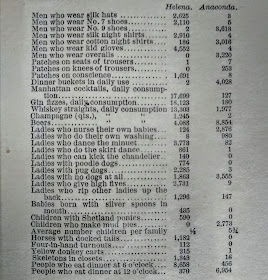The fight
between Anaconda and Helena to become state capital is often portrayed as a
knockout match between the larger-than-life mining millionaires Marcus Daly and
William A. Clark. However, the satirical pamphlet “Helena’s Social Supremacy”
shows how the capital fight was historically characterized as a matter of
social class and local pride as well. As you can imagine, this led to some
highly personal jabs.
The so-called Helena Capital Committee wrote
“Helena’s Social Supremacy” as a mock sequel to the legitimately pro-Helena
pamphlet “An Address to the People of Montana.” They sought to make Helena look
ridiculous through excessive compliment, beginning their sarcastic endorsement
with the following quote:
“That Helena is the social as well as the commercial, financial, agricultural, metallurgical, meteorological, geographical, astronomical, geological, theological, apostolical, political, intellectual, literary, educational, musical, theatrical, legal, medical, metaphysical, artistic, hygienic and esoteric center of Montana, is a fact which should admit of no dispute…”
 |
| A fashionable hold-up at the Broadwater Bar, Helena, MT. |
Even
Helena’s most unsavory sorts were cut from a finer cloth than that of Anaconda.
The Committee informs us, “Helena’s criminal classes are uniformly courteous
and gentlemanly, never doing more injury to your person or feelings than the
necessities of the occasion absolutely demand.” A robbery at the Broadwater Bar
provided the bulk of their evidence.
_______________________________________________________________________________
 |
The Broadwater Bar hold-up, as reported in the Helena
Herald, August 18, 1894.
|
In addition to satirizing Helena’s
well-to-do, the authors played on the Anaconda working class’s existing
feelings of resentment. An entire chapter of the pamphlet is devoted to
snubbing Anaconda miners from their big feet to their dirty coveralls. Another
chapter blames Anaconda’s benefactor, Marcus Daly, for everything from forest
fires to the assassination of French president Sadi Carnot. The grievances of
Helena supporters seemed to have no end:
“Anaconda is lamentably lacking in tally-hoes, four-in-hands, drags, waxed floors, dress suits, Browning clubs, theosophical societies, ceramics, art coteries, eight-course dinners, ten-button gloves, skirt dancing and other social facilities.”
“It is impossible to walk the streets of Anaconda without seeing workingmen and their wives and children, and when the streets are crowded one cannot escape brushing against them.”.
“…the thick, nauseous fumes of corned-beef and cabbage settle over the town like a pall…”
“Anaconda allows no Chinaman within her limits, and all laundry work must be sent to establishments conducted by high-priced American citizens.”
“Neither Marcus Daly nor any other citizen of Anaconda has ever asked Helena’s permission to live.”
The Committee also provided
vital statistics of comparison to convince its most skeptical readers,
including the number of closet skeletons, breastfeeding mothers, and ladies who
gave high fives.
 |
Mock statistics comparing Helena and Anaconda.
|
As much as I’d like to imagine 2,731
ladies high-fiving each other after Helena became the state capital in 1889,
the high five in question most likely refers to a card game also known as
Cinch. A disappointment for sure, but you can’t win them all.
_______________________________________________________________________________
Helena Capital Committee. “Helena’s Social Supremacy: Montana’s Center of Fashion, Refinement, Gentility, Etiquette, Kettle Drums, High Fives, Progressive Euchre and Mixed Drinks.” Helena, Montana: Helena Capital Committee, 1894.
Newby, Rick. “Helena’s Social Supremacy: Political Sarcasm and the Capital Fight.” Montana: The Magazine of Western History 33, no. 4 (Autumn 1987): 68-72.